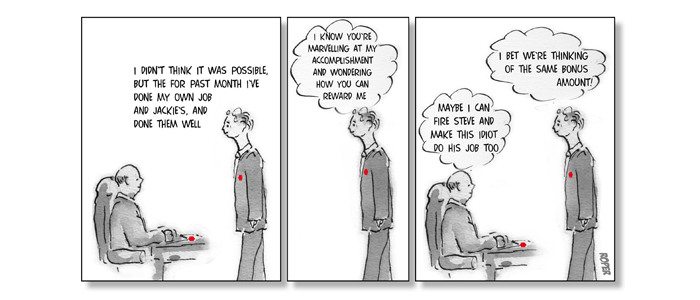Most of the businesses we work with give their staff an annual bonus which on the face of it, sounds like an obvious and positive way to reward people.
But what does the bonus system do to the culture of your organisation? Does it motivate, engage and duly reward your staff for great performance and accountability? Is it the cornerstone of a great team committed to sharing information and best practice? Does it encourage the cross referrals vital to the success of your business?
The work we’ve done recently with our clients who are professional advisors (wealth managers, lawyers, property advisors) suggests that the bonus culture is, to a greater or lesser extent, getting in the way. In other words, instead of rewarding the behaviour that you want, it is divisive and is encouraging a silo mentality that is undermining the success of the business.
What’s going wrong?
Yes, we all have mortgages to pay and families to support, and our financial reward needs to be in line with our needs. The trend towards a lower base salary and emphasis on bonus is supposed to drive performance, but it is stressful because of the lack of certainty and control over the way we live, how we choose to educate our children, for example, or make other significant choices about how we spend our money.
But counter-intuitively, there’s very little evidence to show that over and above a certain level money motivates us, and quite a bit to suggest that it actually demotivates us. One classic analysis showed consistent negative effects of incentives – from money to marshmallows – on motivation. The effects were particularly strong when the tasks were interesting or enjoyable rather than boring or meaningless: in other words, if your job is intrinsically enjoyable and you’re feeling a bit demotivated, you’ll actually feel even more so if your company tries to buck you up by paying you more.
We all need to pay our bills — but perhaps surprisingly, once our basic needs are covered the psychological benefits of money are questionable.
So what are people looking for from you?
It looks as if people need three key things from their leaders:
- A sense of being part of a larger enterprise – an organisation that’s moving forwards, going somewhere and succeeding. And they’ll never know whether this is the case with your organisation unless you keep them continually updated and included.
- The chance to satisfy their intellectual curiosity and learn new skills, and be personally appreciated and acknowledged for doing so. Your status as an organisational leader makes this effect particularly strong, so teach yourself to engage with your staff and give frequent, honest and genuine positive feedback.
- Trust in their managers and regular, honest communication from them – the biggest organisational cause of disengagement is incompetent leadership. So keep the lines of communication open and talk regularly to your staff, both in groups and one on one.
In summary, we’re not suggesting that you do away with your bonus scheme but that you take a long hard look at it. It is evidently not how you can manage performance, so what is it doing for your team, your organisation and your business? A number of our senior fee-earning director clients have done this recently, and are looking at ways they can re-structure bonuses in their organisations so that the emphasis shifts from individual to team performance. They believe that if the existing bonus structure no longer ‘gets in the way’ they will be able to change their approach and behaviour and take their already successful business to the next level.
Do you have a bonus culture within your organisation? We would be interested to hear your views so give us a call on 01865 881056 or email info@leaderslab.co.uk
